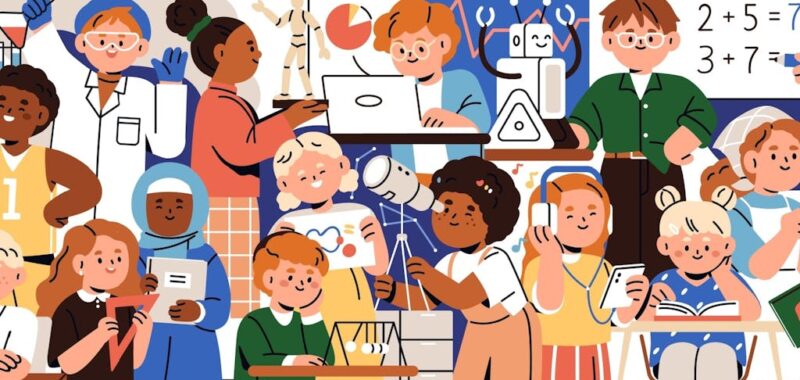As we look back at the K-12 stories that resonated the most with our readers last year, a trend quickly emerges: 2024 was the year of the personal essay.
Columnists and EdSurge Voices of Change fellows clearly captivated our audience with their reflections both technical and emotional. They gave their takes on innovating in math and social emotional learning. They shared first-hand experiences with racism in the workplace. Our top post of the entire year was a vulnerable essay about an administratorâs leadership failure â and how he made things right.
There were also highly read pieces about the ways that educators and school systems are grappling with rapid change: how to make access to algebra equitable for historically disadvantaged students and catch up to new technology standards aiding students with disabilities. And of course, readers were eager for coverage on dealing with the ways artificial intelligence is changing the dynamics of their classrooms.
But overall, EdSurge articles that highlighted educatorsâ experiences and called for more connection gripped readers all year.
Here are the most popular K-12 stories of 2024.
By Nicola Hodkowski

Researcher Nicola Hodkowski makes a case for moving beyond students memorizing the process of doing math and instead fostering a deep understanding of mathematical concepts. Itâs no easy task, but she lays out several strategies educators can use to ensure the concepts stick. The approach pays off in increased student confidence, ability to apply math in the real world and success during more advanced math classes.
By Sarah Wright and Mi Aniefuna

When Black women educators came together as part of an EdSurge research project, they connected over similar experiences with trauma, work-life balance, racism and stress. School administrator Sarah Wright shares her thoughts on a trauma-informed approach to leadership.
By Jessica Kato

There are plenty of characteristics that make Gen Alpha unique from their predecessors. Theyâre the first generation made up completely of kids born in the 21st century, connected by the digital realm almost from birth, and the oldest among them were just 10 when the COVID-19 pandemic struck. Teacher coach Jessica Kato walks educators through how to engage and lean into Gen Alphaâs strengths.
By Daniel Mollenkamp

California made a controversial policy decision last year when it adopted a new math framework that recommends waiting until ninth grade to start students in algebra. Its goal was to make access to algebra, a âgatewayâ to more advanced math classes, standardized and thus more equitable.
By Daniel Mollenkamp

In April, the U.S. Department of Justice expanded the Americans With Disabilities Act to include technology standards in public schools, colleges and universities. The changes were aimed at removing burdens that students with disabilities face when accessing digital content. The onus is now on schools to ensure theyâre purchasing accessible materials â and the clock is ticking away on their two-year deadline.
By katie wills evans

As the world that high school students graduate into continues to change at a rapid clip, teacher katie wills evans observes that the requirements for graduation have stayed the same â leaving students feeling anxious and unprepared to transition to adulthood. She lays out the need for graduation requirements to evolve, considering how little the multiple choice questions or essay prompts on standardized tests have to do with studentsâ lives after high school and their ability to thrive.
By Clementina Jose

SEL professional development opportunities are often disconnected from the realities of life for Black and Latino students who have faced adversity, social worker Clementia Jose explains in her essay. She provides ideas on supporting students regardless of their background or experiences â including the power of listening over imposing solutions.
By Jeffrey R. Young

For better or worse, it seems like ChatGPT and its artificial intelligence brethren are disrupting education norms at nearly every turn. OpenAI opened the floodgates of change again when it made a version of ChatGPT free to all, putting it at the fingertips of every student with an internet connection. It left education experts to strategize how teachers should use AI to their advantage.
By Michael Paul Ida

Teacher Michael Paul Ida often finds himself the only Asian American educator in the room during professional development seminars, putting immense pressure on his shoulders to speak to the experience of students and other educators from his community. In his personal essay, he describes the emotional toll of feeling invisible and why his non-Asian colleagues should start listening â for the benefit of their Asian American peers and students.
By Damen Scott

While Damen Scott worked hard as a principal to make sure staff members felt respected and empowered, a stressful day led to a hurtful interaction with a colleague â shaking his own confidence as a leader in the process. Scott writes about his experience taking accountability and rebuilding trust, and the power of listening.

